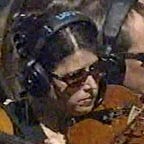Review: Found Theology
Chelle Stearns
Quash, Ben. Found Theology: History, Imagination, and The Holy Spirit. London and New York: Bloomsbury, 2014. ISBN 9780567517920, $35.95.
In Found Theology, theologian Ben Quash searches out new theoretical grounds for a theological engagement with the arts. To do this, he develops a pneumatology that embraces embodied and somatic ways of discovery and knowing. He focuses on how the human imagination encounters historical instances of turbulence and trauma, and how the Holy Spirit enables dynamic and extraordinary insight and innovation during such moments in history. Quash’s primary assumption throughout is that God is active in the world and enlivens the human imagination in all areas of life.
Toward the beginning of Found Theology, Quash illustrates the purpose of his theological exploration with the metaphor of a person carrying a well-stocked rucksack down a trail. He argues that the “found” or the “given” of history is in “the rucksack,” and “the path” is where and how the human imagination is engaged and “finds” meaning, that is what is “found.” Thus, he claims, the path of history is the where the Holy Spirit invites humanity to “relate the given to the found.” Core to this work is the development of an active pneumatology, which has enough capacity to hold the ongoing agency of the Spirit in the world with the sometimes “vertiginously unsettling” awakening of the human imagination in the midst of the human story. In this pneumatology, givens are not threatened or diminished by the findings along the path because all Spirit inspired finding is a revelation of the active work of the one God revealed in Jesus Christ. The God of the givens is the same God of the found.
In Quash’s pneumatology, the Spirit is the person of the Trinity that disrupts our stayed ways of being and releases “unusual imaginative energy and awaken[s] exceptional creative resources” to meet humanity in even our deepest traumas. He argues these confounding experiences are often the very places where we find “the basis for new settlements and new theological thought.” Thus, by looking at a number of historical theological innovations he demonstrates the generative presence of the Spirit in harrowing times.
Quash moves between two major locations of this vertiginously unsettling work of the Spirit in the Christian imagination. The first is in individual and cultural trauma. For example, he provocatively refers to “the ‘founding trauma’ of modern English Christianity” as the very location of Thomas Vaughn’s fretful yet hopeful poetry. Thus, Vaughn’s Christian imagination was enlivened by his cultural trauma without dismissing the seriousness of his sorrow and misery.
The second location of the Spirit’s work is in the experience of art and music. He advocates an, “art which draws us to ask questions, which awakens desire or fear or hope or commitment in us, which prompts our sympathetic imaginations to project different possible ways of living, speaking, and relating, is art working in line with the ‘coulds,’ ‘shoulds,’ ‘mays,’ and ‘wills’ of our language-freighted existence. It thereby reconstitutes us (and equips us) as the historical beings we really are, disciplining us against our habitual instinct to suppose that we live in a fixed element.” Thus, we are literally mixed or shaken up by our encounter with art and in this moment are simultaneously open to the Spirit. Though he never says this overtly in the book, Quash provides a model of artistic experience that is not reliant upon an aesthetic of the sublime or the transcendent but, instead, of the tangible immediacy of the work of the Holy Spirit in human hearts. In other words, when humans experience art, our ears, hearts, and bodies become open to the leading of the Spirit.
Key for any theological engagement with the arts, in his thinking, is an assumption that the triune God is actively at work and always “approaching” humanity. Moreover, because this God is active and has been at work throughout all human history, then it can be affirmed that the Holy Spirit is the “leader” of what C. S. Peirce calls “the abductive mind.” Quash reminds us that it is the day-to-day of history where we relate the givenness of tradition and history to the foundness of life in the Spirit today. This means that the Holy Spirit is actively placing “things to be found” along the pathway of human history, and this is how the Holy Spirit interacts with and enlivens the human imagination.
For Quash, the Holy Spirit rarely acts directly, thus human ways of knowing often have to linger in places of uncertainty and tumult in order for humans to hear and follow the Spirit. He argues that often the most productive human attentiveness takes place in the periphery of our vision, in the process of “abduction,” or in the “thirdness” of experience and things. Both trauma and art cause us to pay attention to this thirdness, but traumatic experience forces us to live and rely upon the intuitive nature of abductive reasoning, while music and art invite us into this realm.
In this book, Quash seeks out the theoretical foundations for the history of major theological innovations and shifts. Along the way, he also points out that artists regularly situate themselves in these moments of dislocation because they are typically seeking truth and inspiration through the more intuitive territory of abductive reasoning. In the end, he develops a theology and a spirituality deeply dependent upon an embodied leading of the Holy Spirit. Although artists and musicians are typically left out of how we think about theology, Quash reminds us that artists are often at the innovative intersections of past and future, trauma and life, theology and spirituality. Artists, then, give us language and experience by which we can move more fully into the ever moving and working God who is the giver of good gifts and who is there to be found.
Chelle Stearns is Associate Professor of Theology at the Seattle School of Theology and Psychology.
